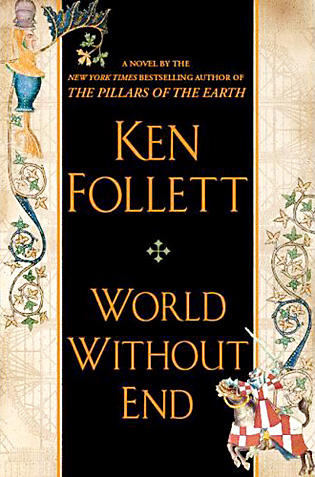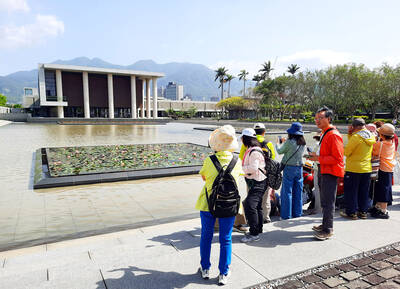In these times of technological overdrive and instant sensory override, it is somehow comforting to run into a novel with enough heft and literary muscle to force you to spend more than a nanosecond taking it all in.
Thriller writer Ken Follett, known more for his espionage novels, has crafted a tale set in medieval England that has more than a touch of soap opera. It also has a healthy dose of ecclesiastical intrigue, historical fiction and just the right amount of love in a time of cholera. It's a potent and potable mixture, one you can savor.
World Without End comes in at more than 1,000 pages, but don't let that weigh you down. It just means there is that much more to enjoy.

Many of Follett's World Without End characters are sympathetic. Then - any novel needs conflict of some sort - there are those that are easy to abhor, and there are many emotional connections in between the extremes.
In addition, Follett tells a story that runs the gamut of life in the Middle Ages, and he does so in such a way that we are not only captivated but also educated. What else could you ask for?
Follett started this story 18 years ago with The Pillars of the Earth, a wildly successful novel that became a best seller in many languages. It was centered on the construction of a mammoth cathedral in Kingsbridge, England, and on the people, both religious and lay, who thrived there.
World Without End is also centered in Kingsbridge, but 200 years after the events in Pillars. The cathedral is still there and it still dominates, not only physically, but also spiritually and commercially. Without it, there would be no Kingsbridge.
It's a world of monks, nuns and priors; knights and their squires; serfs and nobility. It's a feudal world trying to come into the light, but having difficulty voiding the superstitions and beliefs of a darker past. It's a world where men are men and women know it - well, most of them know it, anyway.
It's a world of passions where set-piece battles between armored, sword-swinging soldiers poleaxing each other are common and even lesser violence can rear its ugly head at a moment's notice. It's a world where love and hate are thinly disguised. It's a world of power politics pitted against shady back-room shenanigans.
Into that world, Follett brings us a group of people from differing walks of life, all of whom must come in contact with each other over the several decades spanned in the novel.
There are Merthin the builder and Caris, the daughter of the town's leading merchant, the young lovers who spend much of the novel knowing they should be together but finding themselves pulled apart by circumstances.
There is Merthin's loutish brother, Ralph, a classic villain who manages somehow to have not one redeeming quality and who manages to foul the lives of just about everyone he comes in contact with.
There's the simple but proud Gwenda, a friend of Caris and Merthin since childhood, who can teach her betters what pride and a personal constitution can and should mean.
Then there are all the clergymen - and they are mostly men, of course. With a few notable exceptions they are a conniving, weasely, duplicitous bunch who care more about personal power than matters of the spirit.
But Caris and Merthin take center stage as the main drivers of the action. When the novel opens, they are children. She's of the elite of Kingsbridge while Merthin is the son of a knight whose fortunes have fallen.
They fall in love early, but Caris, being the headstrong one, won't become subservient to a husband. This puts Merthin in a funk, but he soldiers on and, with brains and ingenuity, becomes a resourceful builder.
But Merthin grows weary of the chase, and when circumstances conspire to make Caris unavailable, he leaves Kingsbridge and starts a new life in Florence, Italy, where he becomes incredibly successful.
This is when things really go south for all the inhabitants of World Without End. The plague hits Europe, and people are dying by the thousands. Merthin loses his Italian wife, but he and his young daughter are somehow spared. He decides it's time to return to Kingsbridge and start life over.
While the plague does its worst to the people of Kingsbridge, it also provides Caris with the vehicle to strut her stuff. She has an uncanny ability to sense what should be done. And, while she can't stop the plague's progress, she manages to slow it down.
That is not easy, since the medical procedures she institutes fly in the face of accepted norms as practiced by the so-called learned priest-physicians, and she has to wage that battle, too. But Caris being Caris - and maybe half a millennium ahead of her time - she struggles through and becomes something of a local heroine.
There is more - a lot more - to the story, but you get the gist.
It's fair to say that you won't read this tome in one or even a half-dozen sittings, but reading it won't seem as long as it is. With World Without End, Follett takes you to a time long past and does so with brio and razor-sharp storytelling skills. He has crafted an epic tale in which you will willingly lose yourself for quite a spell.

When the South Vietnamese capital of Saigon fell to the North Vietnamese forces 50 years ago this week, it prompted a mass exodus of some 2 million people — hundreds of thousands fleeing perilously on small boats across open water to escape the communist regime. Many ultimately settled in Southern California’s Orange County in an area now known as “Little Saigon,” not far from Marine Corps Base Camp Pendleton, where the first refugees were airlifted upon reaching the US. The diaspora now also has significant populations in Virginia, Texas and Washington state, as well as in countries including France and Australia.

On April 17, Chinese Nationalist Party (KMT) Chairman Eric Chu (朱立倫) launched a bold campaign to revive and revitalize the KMT base by calling for an impromptu rally at the Taipei prosecutor’s offices to protest recent arrests of KMT recall campaigners over allegations of forgery and fraud involving signatures of dead voters. The protest had no time to apply for permits and was illegal, but that played into the sense of opposition grievance at alleged weaponization of the judiciary by the Democratic Progressive Party (DPP) to “annihilate” the opposition parties. Blamed for faltering recall campaigns and faced with a KMT chair

Article 2 of the Additional Articles of the Constitution of the Republic of China (中華民國憲法增修條文) stipulates that upon a vote of no confidence in the premier, the president can dissolve the legislature within 10 days. If the legislature is dissolved, a new legislative election must be held within 60 days, and the legislators’ terms will then be reckoned from that election. Two weeks ago Taipei Mayor Chiang Wan-an (蔣萬安) of the Chinese Nationalist Party (KMT) proposed that the legislature hold a vote of no confidence in the premier and dare the president to dissolve the legislature. The legislature is currently controlled

Dull functional structures dominate Taiwan’s cityscapes. But that’s slowly changing, thanks to talented architects and patrons with deep pockets. Since the start of the 21st century, the country has gained several alluring landmark buildings, including the two described below. NUNG CHAN MONASTERY Dharma Drum Mountain (法鼓山, DDM) is one of Taiwan’s most prominent religious organizations. Under the leadership of Buddhist Master Sheng Yen (聖嚴), who died in 2009, it developed into an international Buddhist foundation active in the spiritual, cultural and educational spheres. Since 2005, DDM’s principal base has been its sprawling hillside complex in New Taipei City’s Jinshan District (金山). But